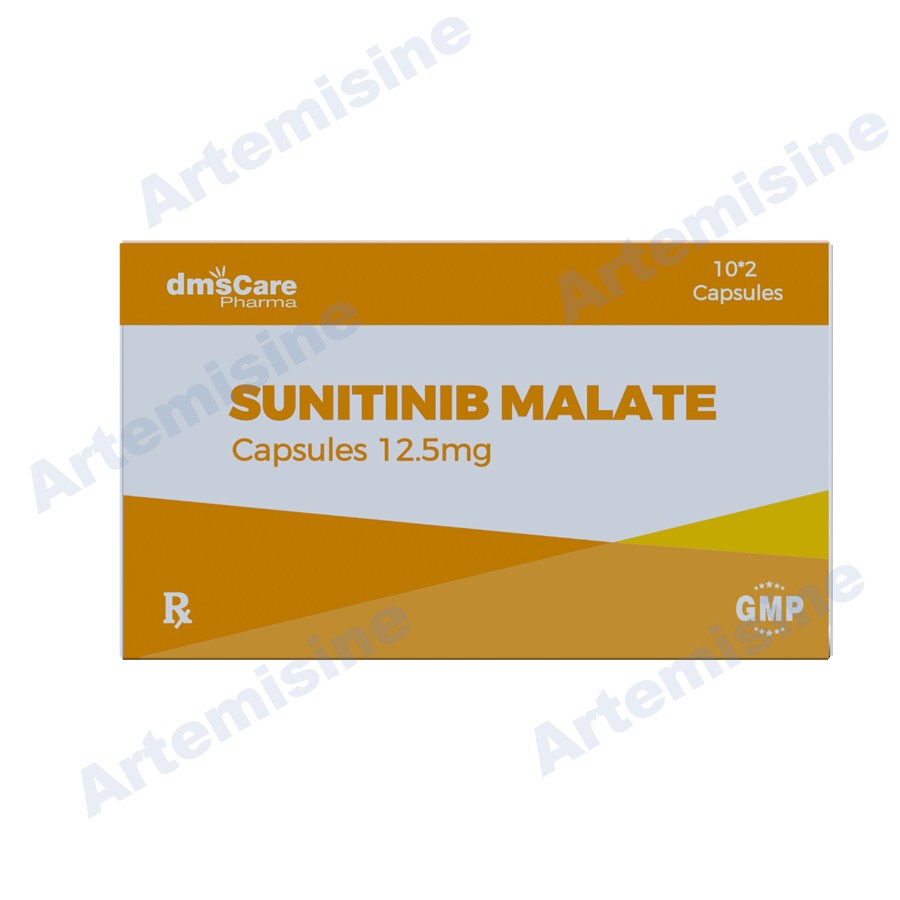Product Description
Products Name:
Sunitinib Malate Capsules
Contains:
Sunitinib Malate 12.5mg
Package:
20 capsules/ box
Indications and Usage for Sunitinib
Sunitinib malate capsules are a kinase inhibitor indicated for:
- treatment of adult patients with gastrointestinal stromal tumor (GIST) after disease progression on or intolerance to imatinib mesylate. ( 1.1)
- treatment of adult patients with advanced renal cell carcinoma (RCC).
- adjuvant treatment of adult patients at high risk of recurrent RCC following nephrectomy.
- treatment of progressive, well-differentiated pancreatic neuroendocrine tumors (pNET) in adult patients with unresectable locally advanced or metastatic disease.
Sunitinib Dosage and Administration
Sunitinib malate capsules are a kinase inhibitor indicated for:
- treatment of adult patients with gastrointestinal stromal tumor (GIST) after disease progression on or intolerance to imatinib mesylate.
- treatment of adult patients with advanced renal cell carcinoma (RCC).
- adjuvant treatment of adult patients at high risk of recurrent RCC following nephrectomy.
- treatment of progressive, well-differentiated pancreatic neuroendocrine tumors (pNET) in adult patients with unresectable locally advanced or metastatic disease.
Dosage Forms and Strengths
Capsules: 12.5 mg, 25 mg, 37.5 mg, 50 mg sunitinib
Contraindications
None
Warnings and Precautions
- Hepatotoxicity: Fatal liver failure has been observed. Monitor liver function tests at baseline, during each cycle, and as clinically indicated. Interrupt sunitinib malate for Grade 3 hepatotoxicity until resolution to Grade ≤1 or baseline and resume sunitinib malate at a reduced dose; discontinue if no resolution. Discontinue sunitinib malate in patients with Grade 4 hepatoxicity, in patients who have subsequent severe changes in liver function tests or other signs and symptoms of liver failure.
- Cardiovascular Events: Myocardial ischemia, myocardial infarction, heart failure, cardiomyopathy, and decreased left ventricular ejection fraction (LVEF) to below the lower limit of normal including death have occurred. Monitor for signs and symptoms of congestive heart failure and consider monitoring LVEF at baseline and periodically during treatment. Discontinue sunitinib malate for clinical manifestations of congestive heart failure. Interrupt and/or dose reduce for decreased LVEF.
- QT Interval Prolongation and Torsade de Pointes: Monitor patients at higher risk for developing QT interval prolongation. Consider monitoring of electrocardiograms and electrolytes.
- Hypertension: Monitor blood pressure at baseline and as clinically indicated. Initiate and/or adjust antihypertensive therapy as appropriate. Interrupt sunitinib malate for Grade 3 hypertension until resolution to Grade ≤1 or baseline, then resume sunitinib malate at a reduced dose. Discontinue sunitinib malate in patients who develop Grade 4 hypertension.
- Hemorrhagic Events: Tumor-related hemorrhage and viscus perforation (both with fatal events) have occurred. Perform serial complete blood counts and physical examinations. Interrupt sunitinib malate for Grade 3 or 4 hemorrhagic events until resolution to Grade ≤1 or baseline, then resume at a reduced dose; discontinue if no resolution.
- Tumor Lysis Syndrome (TLS): TLS (some fatal) has been reported primarily in patients with RCC and GIST. Monitor these patients and treat as clinically indicated.
- Thrombotic microangiopathy (TMA): TMA, including thrombotic thrombocytopenic purpura and hemolytic uremic syndrome, sometimes leading to renal failure or a fatal outcome, has been reported. Discontinue sunitinib malate for TMA.
- Proteinuria: Renal failure or a fatal outcome has occurred. Monitor urine protein. Interrupt treatment for 24-hour urine protein of 3 or more grams. Discontinue for repeat episodes of 24-hour urine protein of 3 or more grams despite dose reductions or nephrotic syndrome.
- Dermatologic Toxicities: Necrotizing fasciitis, erythema multiforme, Stevens-Johnson syndrome (SJS), and toxic epidermal necrolysis (TEN) (some fatal) have occurred. Discontinue sunitinib malate for these events.
- Reversible Posterior Leukoencephalopathy Syndrome (RPLS): RPLS (some fatal) has been reported. Monitor for signs and symptoms of RPLS. Withhold sunitinib malate until resolution.
- Thyroid Dysfunction: Monitor thyroid function at baseline, periodically during treatment, and as clinically indicated. Initiate and/or adjust therapy for thyroid dysfunction as appropriate.
- Hypoglycemia: Check blood glucose levels regularly and assess if antidiabetic drug dose modifications are required.
- Osteonecrosis of the Jaw (ONJ): Withhold sunitinib malate for at least 3 weeks prior to invasive dental procedure and for development of ONJ until complete resolution.
- Impaired Wound Healing: Withhold sunitinib malate for at least 3 weeks prior to elective surgery. Do not administer for at least 2 weeks following major surgery and until adequate wound healing. The safety of resumption of sunitinib malate after resolution of wound healing complications has not been established.
- Embryo-Fetal Toxicity: Can cause fetal harm. Advise patients of potential risk to a fetus and to use effective contraception.
Adverse Reactions/Side Effects
- The most common adverse reactions (≥25%) are fatigue/asthenia, diarrhea, mucositis/stomatitis, nausea, decreased appetite/anorexia, vomiting, abdominal pain, hand-foot syndrome, hypertension, bleeding events, dysgeusia/altered taste, dyspepsia, and thrombocytopenia.
